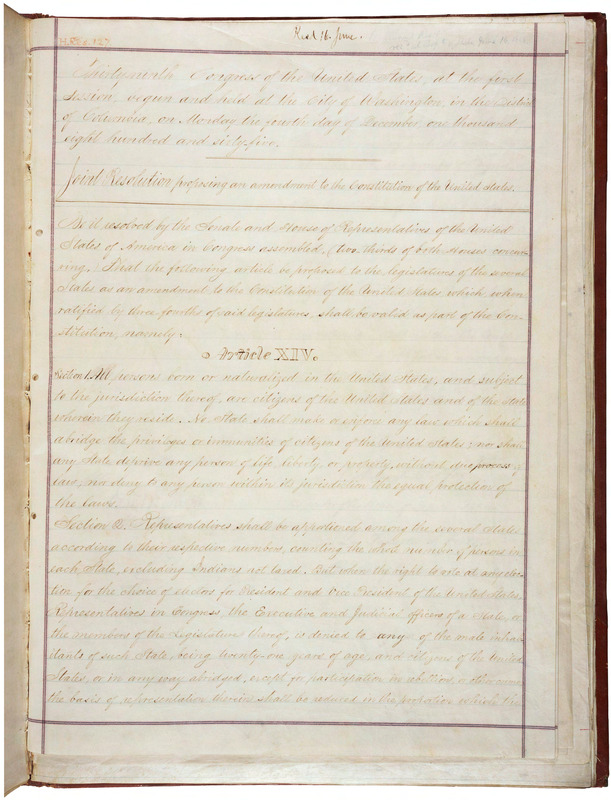14th Amendment to the United States Constitution (1868)
Section 1. All persons born or naturalized in the United States, and subject to the jurisdiction thereof, are citizens of the United States and of the State wherein they reside. No State shall make or enforce any law which shall abridge the privileges or immunities of citizens of the United States; nor shall any State deprive any person of life, liberty, or property, without due process of law; nor deny to any person within its jurisdiction the equal protection of the laws.
Section 2. Representatives shall be apportioned among the several States according to their respective numbers, counting the whole number of persons in each State, excluding Indians not taxed. But when the right to vote at any election for the choice of electors for President and Vice-President of the United States, Representatives in Congress, the Executive and Judicial officers of a State, or the members of the Legislature thereof, is denied to any of the male inhabitants of such State, being twenty-one years of age, and citizens of the United States, or in any way abridged, except for participation in rebellion, or other crime, the basis of representation therein shall be reduced in the proportion which the number of such male citizens shall bear to the whole number of male citizens twenty-one years of age in such State.
Section 3. No person shall be a Senator or Representative in Congress, or elector of President and Vice-President, or hold any office, civil or military, under the United States, or under any State, who, having previously taken an oath, as a member of Congress, or as an officer of the United States, or as a member of any State legislature, or as an executive or judicial officer of any State, to support the Constitution of the United States, shall have engaged in insurrection or rebellion against the same, or given aid or comfort to the enemies thereof. But Congress may by a vote of two-thirds of each House, remove such disability.
Section 4. The validity of the public debt of the United States, authorized by law, including debts incurred for payment of pensions and bounties for services in suppressing insurrection or rebellion, shall not be questioned. But neither the United States nor any State shall assume or pay any debt or obligation incurred in aid of insurrection or rebellion against the United States, or any claim for the loss or emancipation of any slave; but all such debts, obligations and claims shall be held illegal and void.
Section 5. The Congress shall have power to enforce, by appropriate legislation, the provisions of this article.
Linked resources
Items linked to this Document
| Title | Description | Class |
|---|---|---|
 Equal Protection, Reconstruction, and the Meaning of the 14th Amendment Equal Protection, Reconstruction, and the Meaning of the 14th Amendment |
This teaching module discusses the 14th Amendment and the implications of equal protection under the law, featuring a webinar with Kate Masur, author of the 2021 book, Until Justice Be Done: America's First Civil Rights Movement, from the Revolution to Reconstruction. | |
 Legalizing Whiteness: What Asian American Legal History Tells Us About Citizenship in the Early 20th Century Legalizing Whiteness: What Asian American Legal History Tells Us About Citizenship in the Early 20th Century |
This teaching module explains how the Supreme Court determined Asian American legal standings in the early 20th century through the lens of and priority toward whiteness. | |
 The Worst Trickster Story Ever Told: Native America, the Supreme Court, and the U.S. Constitution The Worst Trickster Story Ever Told: Native America, the Supreme Court, and the U.S. Constitution |
This teaching module looks the Supreme Court's understanding of Native America from an Indigenous perspective, featuring a webinar with Keith Richotte, Jr., author of the 2025 book, The Worst Trickster Story Ever Told: Native America, the Supreme Court, and the U.S. Constitution. |
- Title
- 14th Amendment to the United States Constitution (1868)
- Description
- The Fourteenth Amendment gave citizenship to all persons born or naturalized in the United States. The Equal Protection clause drastically amended the Constitution and has been used by the Supreme Court to justify expansion of rights. The amendment was passed by Congress June 13, 1866, and ratified July 9, 1868.
- Date
- 1868-07-09
- Author
- United States. Congress
- Subject
- African Americans
- Spatial Coverage
- United States
- Document Type
- Constitutional Amendment
- Document Category
- Primary Source
- Bluebook Citation
- U.S. Const. amend. XIV
- Digital Repository
- National Archives
- Item sets
- The Worst Trickster Story Ever Told: Native America, the Supreme Court, and the U.S. Constitution
- Equal Protection, Reconstruction, and the Meaning of the 14th Amendment
- Legalizing Whiteness: What Asian American Legal History Tells Us About Citizenship in the Early 20th Century
- Latina/os and Criminal and Immigration Law Enforcement
- Title
- 14th Amendment to the United States Constitution (1868)
- Description
- The Fourteenth Amendment gave citizenship to all persons born or naturalized in the United States. The Equal Protection clause drastically amended the Constitution and has been used by the Supreme Court to justify expansion of rights. The amendment was passed by Congress June 13, 1866, and ratified July 9, 1868.
- Date
- 1868-07-09
- Author
- United States. Congress
- Subject
- African Americans
- Spatial Coverage
- United States
- Document Type
- Constitutional Amendment
- Document Category
- Primary Source
- Bluebook Citation
- U.S. Const. amend. XIV
- Digital Repository
- National Archives
- Item sets
- The Worst Trickster Story Ever Told: Native America, the Supreme Court, and the U.S. Constitution
- Equal Protection, Reconstruction, and the Meaning of the 14th Amendment
- Legalizing Whiteness: What Asian American Legal History Tells Us About Citizenship in the Early 20th Century
- Latina/os and Criminal and Immigration Law Enforcement
